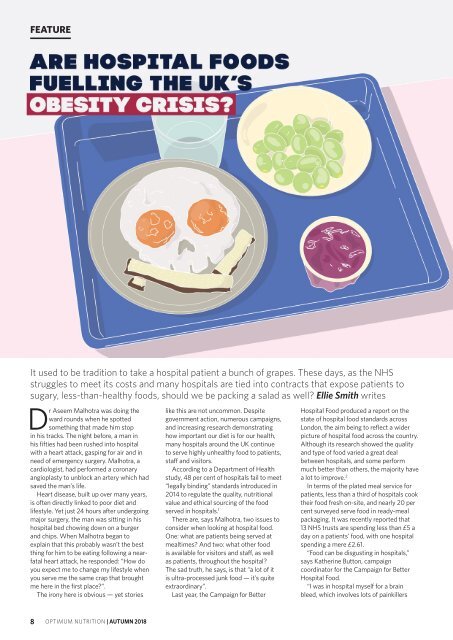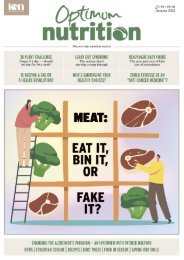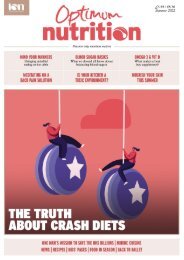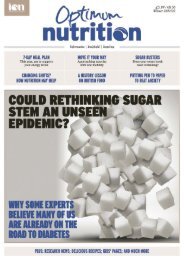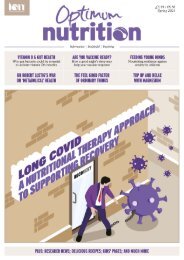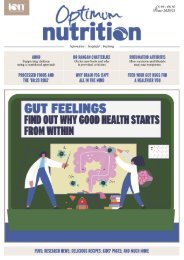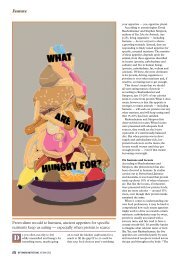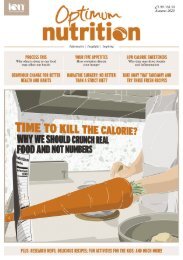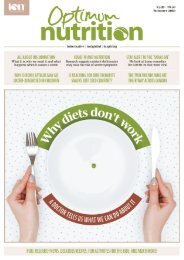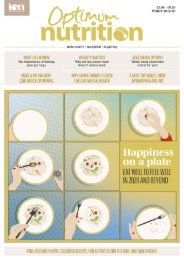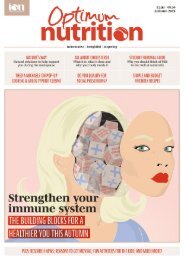You also want an ePaper? Increase the reach of your titles
YUMPU automatically turns print PDFs into web optimized ePapers that Google loves.
FEATURE<br />
It used to be tradition to take a hospital patient a bunch of grapes. These days, as the NHS<br />
struggles to meet its costs and many hospitals are tied into contracts that expose patients to<br />
sugary, less-than-healthy foods, should we be packing a salad as well? Ellie Smith writes<br />
Dr Aseem Malhotra was doing the<br />
ward rounds when he spotted<br />
something that made him stop<br />
in his tracks. The night before, a man in<br />
his fifties had been rushed into hospital<br />
with a heart attack, gasping for air and in<br />
need of emergency surgery. Malhotra, a<br />
cardiologist, had performed a coronary<br />
angioplasty to unblock an artery which had<br />
saved the man’s life.<br />
Heart disease, built up over many years,<br />
is often directly linked to poor diet and<br />
lifestyle. Yet just 24 hours after undergoing<br />
major surgery, the man was sitting in his<br />
hospital bed chowing down on a burger<br />
and chips. When Malhotra began to<br />
explain that this probably wasn’t the best<br />
thing for him to be eating following a nearfatal<br />
heart attack, he responded: “How do<br />
you expect me to change my lifestyle when<br />
you serve me the same crap that brought<br />
me here in the first place?”.<br />
The irony here is obvious — yet stories<br />
like this are not uncommon. Despite<br />
government action, numerous campaigns,<br />
and increasing research demonstrating<br />
how important our diet is for our health,<br />
many hospitals around the UK continue<br />
to serve highly unhealthy food to patients,<br />
staff and visitors.<br />
According to a Department of Health<br />
study, 48 per cent of hospitals fail to meet<br />
“legally binding” standards introduced in<br />
2014 to regulate the quality, nutritional<br />
value and ethical sourcing of the food<br />
served in hospitals. 1<br />
There are, says Malhotra, two issues to<br />
consider when looking at hospital food.<br />
One: what are patients being served at<br />
mealtimes? And two: what other food<br />
is available for visitors and staff, as well<br />
as patients, throughout the hospital?<br />
The sad truth, he says, is that “a lot of it<br />
is ultra-processed junk food — it’s quite<br />
extraordinary”.<br />
Last year, the Campaign for Better<br />
Hospital Food produced a report on the<br />
state of hospital food standards across<br />
London, the aim being to reflect a wider<br />
picture of hospital food across the country.<br />
Although its research showed the quality<br />
and type of food varied a great deal<br />
between hospitals, and some perform<br />
much better than others, the majority have<br />
a lot to improve. 2<br />
In terms of the plated meal service for<br />
patients, less than a third of hospitals cook<br />
their food fresh on-site, and nearly 20 per<br />
cent surveyed serve food in ready-meal<br />
packaging. It was recently reported that<br />
13 NHS trusts are spending less than £5 a<br />
day on a patients’ food, with one hospital<br />
spending a mere £2.61.<br />
“Food can be disgusting in hospitals,”<br />
says Katherine Button, campaign<br />
coordinator for the Campaign for Better<br />
Hospital Food.<br />
“I was in hospital myself for a brain<br />
bleed, which involves lots of painkillers<br />
8 OPTIMUM NUTRITION | AUTUMN <strong>2018</strong>


